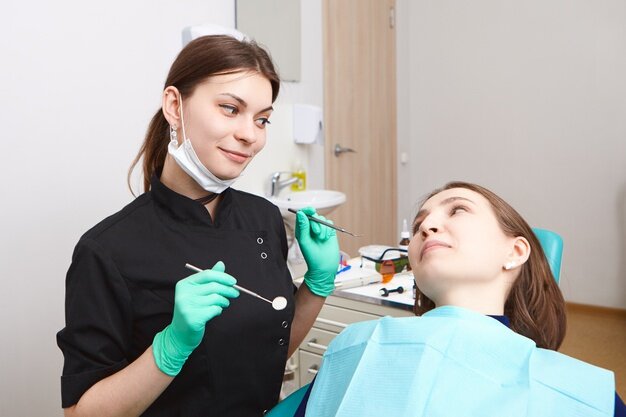If you are stressed out, feeling alone, or carrying a lot of burden of professional life, nothing can help you better to overcome your struggling phase other than a pretty smile. It's damn true. Yes, medicines and treatments can help you a lot to overcome these conditions, but if you have a beautiful smile, you may automatically find the solutions to all your problems.
There could be several reasons why a beautiful smile is imperative. One of those reasons is maintaining overall good dental health. If someone’s smile makes you smile and it looks so pretty and pleasing to you, the reason behind such a pretty smile is a good oral hygiene. And to get good dental health, you need good dental care regularly.
Good dental care is important to keep your oral health in an optimal condition and keep dental diseases away. But in some cases, you need more than good oral care to keep your oral health in a good condition. A few of those cases are:
Unaligned Teeth
Crooked Teeth
Crowded Teeth
These dental problems come under orthodontics. If you have any of these dental problems, you need more than good oral care. You need either Invisalign treatment or traditional metal braces treatment.
Now, let's understand what Invisalign treatment and traditional metal braces treatment are.
What is Invisalign Treatment?
Invisalign treatment is a process of treating mainly unaligned, crooked, and crowded teeth with the aid of a series of dental clear aligners (commonly known as Invisalign). These dental clear aligners are worn by the patients for a certain period of time, as suggested by the concerned dentist. They push the unaligned, crooked, and crowded teeth into their actual position and gradually straighten the whole teeth line. This treatment process can take a few weeks and months (depending on the condition of the teeth line), but eventually, it gives the best result.
It is one of the newest developments or discoveries of modern dentistry. With this treatment, millions of dental patients get a reason to smile all across the world, and today, they all are living their lives happily. In a real sense, it is a revolutionizing development of modern dentistry. Also, some of the world-class dentists such as Invisalign specials McKinney TX strongly say that Invisalign is the future of modern dentistry.
What Are Dental Braces Treatment?
Dental braces treatment is a traditional method of treating mainly unaligned, crooked, and crowded teeth with the aid of metal bracket aligners (commonly known as dental braces and orthodontic cases). These dental braces gradually push the unaligned teeth right side so that they can get into shape. Nowadays, they are not much preferred due to the coming of Invisalign.
Which One to Choose?
Due to the availability of two different teeth straightening treatments in modern dentistry, the patients often get in the dilemma of whether they should select dental braces treatment or Invisalign treatment. If you are one of those who are confused between both, we are here to guide you.
Generally, the decision of which treatment is best for your teeth condition is not taken by the patient. It is totally decided or suggested by the dentist in most cases. But dentist also keeps in mind the priority of the patient which he/she has made based on looking to his/her pocket, time involved in the process, and other factors.
Our suggestion for you is to go with your dentist as they know better which treatment perfectly fits your teeth straightening requirements. After examining your teeth condition, whether your dentist suggests dental braces treatment or Invisalign treatment, you should go with him/her without caring about what your choices are. Yes, you can share your preferences with your dentist so that the dentist can prioritize your choice, and if possible he/she can suggest the same treatment for you.
If we have to decide the one based on their credibility, undoubtedly, we would suggest Invisalign as it is the best teeth straightening treatment. A number of reasons are there why we have made it our first choice as many dentists and dental clinics also prefer it above other dental treatments when it comes to aligning your teeth well. Let’s find out why.
Why Invisalign is Better Than Dental Braces?
Invisalign is better teeth straightening treatment as compared to dental braces. Here is why:
Invisalign is Clear- Invisalign is colorless, meaning they are clear and transparent. When patients wear it on the surface of their teeth, it seems like they wear nothing because it is not visible to the third person. It is one of the biggest advantages for those patients who feel confident less after wearing dental braces which are clearly visible to everyone.
Invisalign is Easily Removable- Before eating and drinking, patients can easily remove Invisalign as it is easily removable. While if we talk about dental braces, they are not removable devices.
Invisalign Heals Quicker than Dental Braces- This is another big benefit of Invisalign. Due to its amazing technology, it aligns perfectly the unaligned teeth quicker than dental braces.
It is Easily Replaceable- To treat unaligned teeth, Invisalign is worn in a series. Therefore, patients need to replace its Invisalign every two weeks as suggested by the concerned dentist. Unlike dental braces, Invisalign is easily replaceable.
Apart from the above-mentioned reasons, there are more reasons to choose Invisalign. However, it is always a good option to go with your concerned dentist as he/she better knows what you really need to get your unaligned teeth aligned quickly. So, keep all these things in mind when you visit a dentist for a quick dental checkup and taking teeth straightening treatment.






